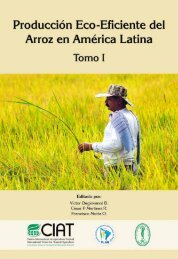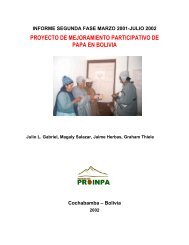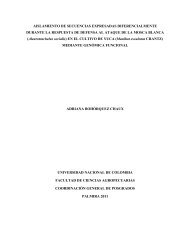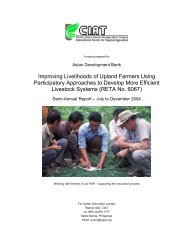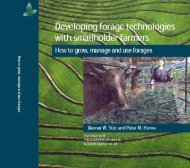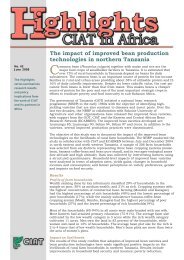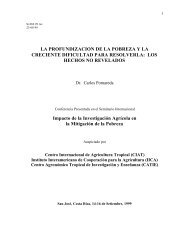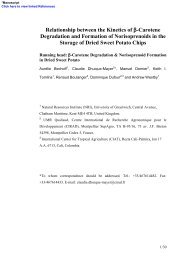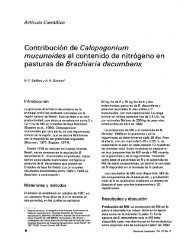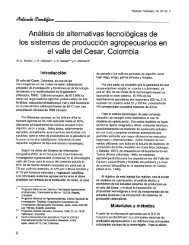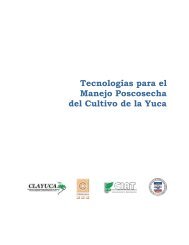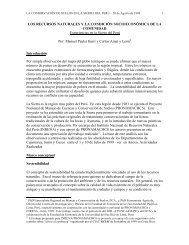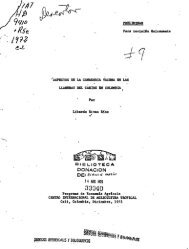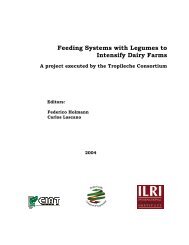Whitefly and whitefly-borne viruses in the tropics : Building a ... - cgiar
Whitefly and whitefly-borne viruses in the tropics : Building a ... - cgiar
Whitefly and whitefly-borne viruses in the tropics : Building a ... - cgiar
Create successful ePaper yourself
Turn your PDF publications into a flip-book with our unique Google optimized e-Paper software.
producers used twigs to apply pesticide,<br />
<strong>in</strong>stead of a knapsack sprayer, result<strong>in</strong>g<br />
<strong>in</strong> poor coverage <strong>and</strong> greater loss of<br />
pesticides. Most producers (67%)<br />
applied <strong>in</strong>secticides as a preventive<br />
measure, 17% applied <strong>in</strong>secticides<br />
when <strong>the</strong>y observed <strong>whitefly</strong>/TYLCV<br />
damage, while 8% applied <strong>in</strong>secticides<br />
accord<strong>in</strong>g to calendar.<br />
Vegetable growers <strong>in</strong> Gezira <strong>and</strong><br />
Rahad illegally obta<strong>in</strong> part of <strong>the</strong>ir<br />
supply of chemicals from <strong>the</strong> stocks of<br />
cotton schemes. These <strong>in</strong>clude highly<br />
toxic “cocktails” of <strong>in</strong>secticide,<br />
exclusively recommended for use on<br />
cotton. Their experience of severe<br />
<strong>whitefly</strong> outbreaks <strong>in</strong> previous seasons<br />
leads most of <strong>the</strong>m to use excessive<br />
quantities of <strong>the</strong>se chemicals. As a<br />
result, environmental contam<strong>in</strong>ation,<br />
occupational health hazards <strong>and</strong><br />
production costs are on <strong>the</strong> <strong>in</strong>crease. In<br />
addition, <strong>the</strong> overuse of chemicals to<br />
control <strong>whitefly</strong> seemed to have resulted<br />
<strong>in</strong> <strong>the</strong> build-up of previously secondary<br />
pests such as H. armigera, L. sativae<br />
<strong>and</strong> Scrobipalpa sp. Never<strong>the</strong>less,<br />
several producers suffered complete<br />
loss of even <strong>the</strong> treated crop.<br />
Several researchers (e.g., Ahmed et<br />
al., 1987; Dittrich et al., 1990) have<br />
documented <strong>the</strong> resistance status of<br />
B. tabaci <strong>in</strong> cotton to various<br />
<strong>in</strong>secticides <strong>in</strong> <strong>the</strong> Sudan. They<br />
reported that B. tabaci showed high<br />
levels of resistance to many<br />
organophosphates <strong>and</strong> syn<strong>the</strong>tic<br />
pyrethroids <strong>and</strong> moderate resistance to<br />
carbamates <strong>and</strong> organochlor<strong>in</strong>es. The<br />
specific levels of resistance reported<br />
vary depend<strong>in</strong>g on <strong>the</strong> source of <strong>the</strong><br />
samples, <strong>the</strong> history of <strong>in</strong>secticide<br />
application <strong>in</strong> that area, <strong>the</strong> time of <strong>the</strong><br />
year when bioassays were done <strong>and</strong> <strong>the</strong><br />
sensitivity of <strong>the</strong> <strong>whitefly</strong> population<br />
used. However, <strong>the</strong> reports were<br />
primarily based on dose responses of<br />
whiteflies <strong>in</strong> <strong>the</strong> cotton monoculture<br />
system. Pesticide resistance of<br />
126<br />
Whiteflies <strong>and</strong> <strong>Whitefly</strong>-<strong>borne</strong> Viruses <strong>in</strong> <strong>the</strong> Tropics<br />
whiteflies <strong>in</strong> <strong>the</strong> mixed vegetable<br />
cropp<strong>in</strong>g systems <strong>in</strong> <strong>the</strong> Sudan has not<br />
been documented.<br />
Sudan is <strong>the</strong> only country <strong>in</strong> East<br />
Africa that has adopted IPM as its<br />
official crop protection policy. The<br />
government’s position is well def<strong>in</strong>ed <strong>in</strong><br />
a recent publication entitled “Sudan<br />
Country Strategy Note, 1997-2001:<br />
Partnership towards Susta<strong>in</strong>able<br />
Human Development”. The document<br />
emphasizes that <strong>the</strong> government of <strong>the</strong><br />
Sudan is pursu<strong>in</strong>g an <strong>in</strong>tegrated<br />
program for environmentally<br />
susta<strong>in</strong>able development. However,<br />
implementation of <strong>the</strong> policy is m<strong>in</strong>imal,<br />
particularly, <strong>in</strong> <strong>the</strong> case of vegetable<br />
farm<strong>in</strong>g, because of farmers’ ignorance<br />
of alternatives to chemical control,<br />
which <strong>in</strong> turn is ma<strong>in</strong>ly attributed to <strong>the</strong><br />
lack of effective extension services <strong>in</strong><br />
this sector. In <strong>the</strong> absence of<br />
alternatives, chemical control of <strong>the</strong><br />
<strong>whitefly</strong> <strong>the</strong>refore rema<strong>in</strong>s <strong>the</strong> pr<strong>in</strong>cipal<br />
strategy for manag<strong>in</strong>g WTVs.<br />
Streng<strong>the</strong>ned Research<br />
Capacity<br />
Sudan’s participation <strong>in</strong> <strong>the</strong> diagnostic<br />
phase of <strong>the</strong> TWF-IPM Project has<br />
provided a substantial body of<br />
knowledge cover<strong>in</strong>g various aspects,<br />
biological <strong>and</strong> socio-economic, of <strong>the</strong><br />
<strong>whitefly</strong>/WTV problems <strong>in</strong> vegetablebased<br />
cropp<strong>in</strong>g systems <strong>in</strong> <strong>the</strong> country.<br />
Sudan’s participation <strong>in</strong> <strong>the</strong> plann<strong>in</strong>g<br />
workshop <strong>in</strong> April 1997 <strong>and</strong> <strong>the</strong><br />
co-ord<strong>in</strong>ation meet<strong>in</strong>g <strong>in</strong> June 1998<br />
provided national researchers with a<br />
chance to learn from, <strong>and</strong> share ideas<br />
<strong>and</strong> experiences with, scientists from<br />
o<strong>the</strong>r countries. A Ph.D. project on<br />
“Distribution of <strong>whitefly</strong> species (<strong>and</strong><br />
biotypes) <strong>and</strong> <strong>the</strong>ir natural enemies <strong>in</strong><br />
vegetable-based cropp<strong>in</strong>g systems <strong>in</strong><br />
Sudan” was undertaken <strong>in</strong> collaboration<br />
with <strong>the</strong> University of Gezira under <strong>the</strong><br />
auspices of <strong>the</strong> project.



